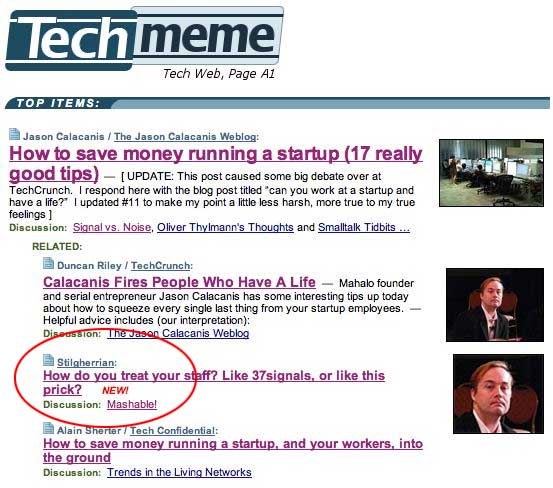A note for folks stumbling across this website thanks to the Jason Calacanis / 37signals / TechCrunch discussion: It’s 4.30pm on a sunny autumn Sunday afternoon here in Sydney. I have been writing a further post which explains, amongst other things, that I’m not trolling (deliberately stirring up controversy), but passionately arguing a genuine concern. I’m amused this has turned into a global controversy, flattered even, when I reckon it’s more a storm in a teacup — though at its heart is a fundamental issue about how we do business. However for the next few hours I’ll be enjoying the remaining sunshine, doing some shopping and generally spending Sunday evening with my beloved. More soon.
Well, I wanted some profile before Australia 2020…
[Update 10 March, 1030 AEDT: I’ve written a follow-up article which, while bound to piss off a few people, explains precisely why I’m so concerned about this issue.]
…but I don’t know whether this was exactly what I had in mind. Calling a high-profile Internet entrepreneur a prick, and then being referenced by some of the highest-traffic tech blogs on the planet.

OK, I participated in the discussion at TechCrunch and the 37signals blog Signal vs Noise, as I should. But then it was picked up by Mashable and then TechMeme (see screenshot). And now I’m seeing inbound from TechCrunch Japan and Colbert Low’s technology blog and who knows where else to come.
Continue reading “Well, I wanted some profile before Australia 2020…”
How do you treat your staff? Like 37signals, or like this prick?
[Update 10 March, 1030 AEDT: I’ve written a follow-up article which, while bound to piss off a few people, explains precisely why I’m so concerned about this issue. There’s also my first follow-up, written on the weekend.]
“Chalk and cheese” is how I’d describe two approaches to staff management I stumbled across this week. One treats staff as trusted contributors to a shared enterprise, the other as disposable work-droids from which you squeeze every last effort.
Jason Calacanis (pictured) has started various firms, including Mahalo, a “human-powered search engine”. (Don’t worry, I’d never heard of it either.) In How to save money running a startup (17 really good tips) there are some good tips — like outsourcing accounting and worrying more about good chairs than tables. But to paraphrase the bad ones:
- Hold meetings at lunchtime so people never get a mental break from work.
- Don’t provide phones so staff have to use their own.
- If someone shows signs of working hard, buy them a computer for home so they end up working nights and weekends too.
- Buy a good coffee machine — not because you’d like to give your employees good coffee, but to prevent them “wasting time” getting it from a nearby barista.
But that’s not the worst…
Continue reading “How do you treat your staff? Like 37signals, or like this prick?”
So who’s ready for the future? Who’s not?
Maxine McKew and I aren’t the only ones who think Australia is ready to start a new conversation about our identity. The Australia 2020 Summit secretariat received 7251 nominations for the 1000 spots. I wish them well with the winnowing — and wish myself good luck with my own application.
The real fun now is seeing who’s actually ready for the future, and who just wants to stifle discussion.
Human rights lobbyist Howard Glenn puts it well, and shows that he’s ready:
Why am I enthusiastic about a relatively small two-day conference in April? Because it is a big gesture which says clearly that we have permission to start thinking about the future again. The flow-on effects are already starting. Schools want to have their own future summits, difficult long term issues are emerging for community debate. And that’s before it’s all really started.
It’s only two days and 1,000 people. Who gets to go is not as important as the fact that it is occurring at all, and that there’s such media attention to the attendance. Some will see it as a revival of the mythical Keating elites; the start of European-style social planning; a talk fest. I see it as the start of a restoration of confidence in Australian culture, identity and ingenuity, and a faith that we can think about future challenges, and find what we need to face them.
So what about everyone else?
Continue reading “So who’s ready for the future? Who’s not?”

